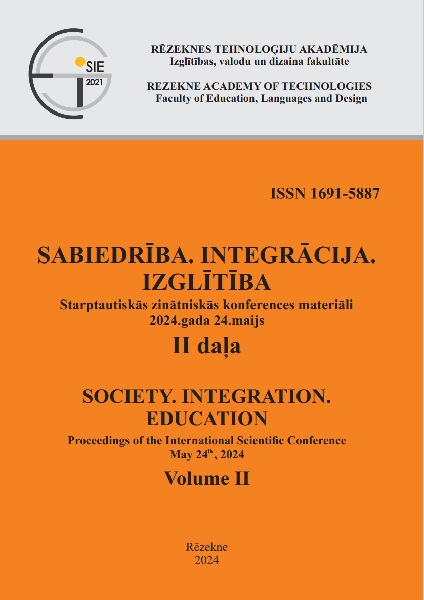THEORETICAL AND METHODOLOGICAL FOUNDATIONS OF OPTIMIZATION OF THE TRAINING PROCESS AND STRATEGIES FOR TRAINING STUDENT-ATHLETES OF HIGH QUALIFICATION IN TEAM SPORTS
DOI:
https://doi.org/10.17770/sie2024vol2.7877Keywords:
game sports, higher education institutions, student-athletes, training processAbstract
The article discloses the main theoretical and methodological foundations of optimization of the training process and strategies for training student-athletes of high qualification in team sports. Team sports are particularly popular in Olympic and professional sports. The modern system of sports training is characterized by progressive principles, a wide range of interdependent tasks, scientifically based selection of means and methods, promising long-term planning, high organization of control, provision of hygienic conditions, etc. The purpose is to substantiate and experimentally test the theoretical and methodological foundations of optimizing the training process and the strategy of training student-athletes of high qualification in team sports on the basis of theoretical and practical analysis of the problem under study; to develop the content of the training process of student-athletes of high qualification in team sports. To achieve the goals, the following methods are used: verbal, visual and practical. These methods are most often used to optimize the training process and training strategy for highly qualified student-athletes in team sports. Also, we describe the methods of optimizing the training process and strategies for training student-athletes of high qualification in team sports, which are divided into general pedagogical, specific, additional methods that are specially developed for the needs of sports practice and optimization of the training process. The content of the training process of student-athletes of high qualification in game sports has been developed, which allows purposeful planning and adjustment of tactics and strategy of training student-athletes in team sports on an objective basis, can be used in higher educational institutions that train student-athletes, and can also be concluded in textbooks and methodological recommendations.
References
Burla, O. M. (2017). Zahalʹna teoriya pidhotovky sport·smeniv: kurs lektsiy i praktykum: navch.-metod. posib. Sumy: Publishing House of the Sumy DPU named after A. S. Makarenko, 2nd ed., ed. and additional. [Datafile]. Retrieved from: https://library.sspu.edu.ua/wpcontent/uploads/2018/04/Burla_Zagalna_teoriya_2016.pdf
Keller, V. S. (1992). Teoretyko-metodychni osnovy pidhotovky sport·smeniv. [Theoretical and methodological basis of training of athletes]. Lviv: Ukrainian Sports Association. Retrieved from: https://repository.ldufk.edu.ua/handle/34606048/20381
Prontenko, K., Griban, G., Medvedeva, I., Aloshyna, A., Bloshchynskyi, I., Bezpaliy, S., ... & Yevtushok, M. (2019). Interrelation of students’ motivation for physical education and their physical fitness level. International Journal of Applied Exercise Physiology, 8(2), 896-900.
Kostyukevich, V. M. (2014). Teoriya i metodyka sportyvnoyi pidhotovky (na prykladi komandnykh ihrovykh vydiv sportu). Tutorial. Vinnytsia: Planer. [Datafile]. Retrieved from: https://library.vspu.edu.ua/polki/akredit/kaf_5/kostukevich13.pdf
Kostyukevich, V. M. (2016). Kontseptsiya modelyuvannya trenuvalʹnoho protsesu sport·smeniv komandnykh ihrovykh vydiv sportu. Zdorovʺya, sport, reabilitatsiya. Health, sports, rehabilitation. 4. 32-38. [Datafile]. Retrieved from: https://core.ac.uk/download/pdf/229304503.pdf
Mudryk Zh.S., Dobrynskyi V.S., Dedelyuk N.A. (2018). Teoriya sportu: Metodychni rekomendatsiyi. Lutsk: SNU named after Lesi Ukrainka.
Platonov V.M., Bulatova M.M. (1995). Fizychna pidhotovka sport·smena. K.: Zdorovya. [Datafile]. Retrieved from: https://repository.ldufk.edu.ua/bitstream/34606048/7054/1/%D0%97%D0%A2%D0%9F%D0%A1_%D0%BD_15_.pdf
Shynkaruk O. A. (2013). Teoriia i metodyka pidhotovky sportsmeniv: upravlinnia, kontrol, vidbir, modeliuvannia ta prohnozuvannia v olimpiiskomu sporti: navch. posibnyk. Kyiv: NVP Polygraph Service. [Datafile]. Retrieved from: https://reposit.uni-sport.edu.ua/handle/787878787/255
Teoriya i metodyka fizychnoho vykhovannya v 2 t. / za zah. red. T. YU. Krutsevych. (2005). K.: Olimpiysʹka literature. [Datafile]. Retrieved from: https://library.megu.edu.ua:9443/jspui/handle/123456789/2984
Tymchyshena N. (2008). Suchasnyy trener u pedahohichniy systemi. Fizychne vykhovannya, sport i kulʹtura zdorovʺya u suchasnomu suspilʹstvi : zb. nauk. pr. Lutsk: Volyn. national University named after Lesi Ukrainka. Vol. 1. Retrieved from: http://www.irbis-nbuv.gov.ua/cgi-bin/irbis_nbuv/cgiirbis_64.exe?I21DBN=LINK&P21DBN=UJRN&Z21ID=&S21REF=10&S21CNR=20&S21STN=1&S21FMT=ASP_meta&C21COM=S&2_S21P03=FILA=&2_S21STR=Fvs_2008_1_74
Vilchkovskyy, E. S. (2002). Profesiyna spryamovanistʹ pidhotovky fakhivtsiv z fizychnoho vykhovannya. Rozvytok pedahohichnoyi i psykholohichnoyi nauk v Ukrayini. Vilchkovskyi: coll. of science pr. Kh.: OVS. Part 1. [Datafile]. Retrieved from: http://document.kdu.edu.ua/info_zab/014_312.pdf






